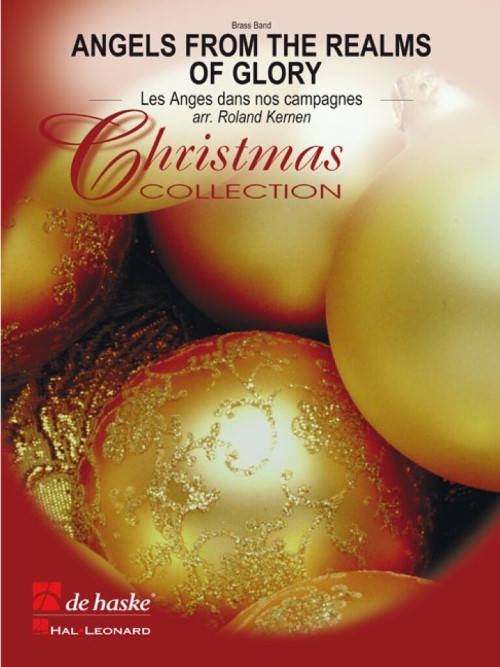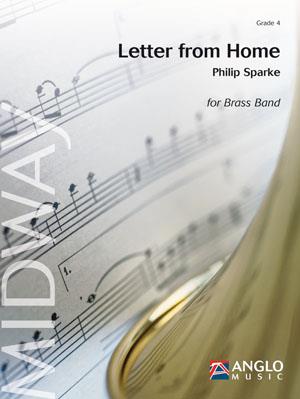Results
-
£29.95
California (Brass Band - Score and Parts) - Soderstrom, Emil
In retirement, Emil Soderstrom moved to California and honoured his new home with this light-hearted but demanding march. The composer has said that the motif given to the upper cornets in the second strain stands for 'Ca-li-for-nia'! His love of startling chromatic passages is evident in the 'break up' strain of the trio section which is marked by a sudden key change and a fragment of the song Sunshine in my soul today, a reference to the Californian weather.
Estimated dispatch 7-14 working days
-
£14.95
California (Brass Band - Score only) - Soderstrom, Emil
In retirement, Emil Soderstrom moved to California and honoured his new home with this light-hearted but demanding march. The composer has said that the motif given to the upper cornets in the second strain stands for 'Ca-li-for-nia'! His love of startling chromatic passages is evident in the 'break up' strain of the trio section which is marked by a sudden key change and a fragment of the song Sunshine in my soul today, a reference to the Californian weather.
Estimated dispatch 7-14 working days
-
£29.95
To Regions Fair (Brass Band - Score and Parts) - Bearcroft, Norman
Clive Bright, in his score note when To Regions Fair was originally published in 1958, predicted that the march would 'have a good run'. In retrospect, this turned out to be something of an understatement as this march (and many other Bearcroft marches) remains vibrantly active fifty years after its original publication. The title is derived from the song 'Meet in bliss' which is featured in the trio section.
Estimated dispatch 7-14 working days
-
£14.95
To Regions Fair (Brass Band - Score only) - Bearcroft, Norman
Clive Bright, in his score note when To Regions Fair was originally published in 1958, predicted that the march would 'have a good run'. In retrospect, this turned out to be something of an understatement as this march (and many other Bearcroft marches) remains vibrantly active fifty years after its original publication. The title is derived from the song 'Meet in bliss' which is featured in the trio section.
Estimated dispatch 7-14 working days
-
 £59.99
£59.99Angels from the Realms of Glory (Brass Band - Score and Parts) - Kernen, Roland
The title of this clever arrangement reveals the Christmas song it is based on. The melody can be traced back to a French folksong from the 18th century which is now known around the world. In France it is called Les anges dans nos campagnes, in Germany it is most widely known as Engel auf den Feldern singen and in England it was originally called Angels From the Realms of Glory but it often known as Angels We Have Heard on High. Everyone will rejoice upon hearing the Gloria in excelsis Deo refrain!Duration: 5:45
Estimated dispatch 7-14 working days
-
 £72.99
£72.99Letter from Home (Brass Band - Score and Parts) - Sparke, Philip
In Letter from Home Philip Sparke portrays the many feelings and emotions that a letter from home can evoke. This intimate works opens with a gentle melody, which gradually becomes more confused as new emotions are introduced. Finally resignation sets in, but a sense of peace and balance is restored with the final chorale. In this emotional work Philip Sparke truly captures the highs and lows of being away from home.Duration: 7:15
Estimated dispatch 7-14 working days
-
£29.95
In Christ Alone (Euphonium Solo with Brass Band - Score and Parts) - Phillips, Richard
The popularity of this modern song is evidenced by the frequent use it enjoys during Sunday worship in many different denominational churches. The strength and solidity of the song is reflected in this triumphal arrangement, written at the request of Derick Kane and as a sequel to the earlier euphonium solo, 'There Will Be God'.
Estimated dispatch 7-14 working days
-
£14.95
In Christ Alone (Euphonium Solo with Brass Band - Score only) - Phillips, Richard
The popularity of this modern song is evidenced by the frequent use it enjoys during Sunday worship in many different denominational churches. The strength and solidity of the song is reflected in this triumphal arrangement, written at the request of Derick Kane and as a sequel to the earlier euphonium solo, 'There Will Be God'.
Estimated dispatch 7-14 working days
-
£29.95
Just As I Am (Brass Band - Score and Parts) - Heaton, Wilfred
A typically dramatic 'classic' by Heaton. Published in 1947 but written many years before, this timeless composition is more than 'just a hymn setting' - more a miniature Tone Poem of real Heaton intensity. Immensely popular for both SA and 'contesting' bands and featured on no less than 6 recordings in this catalogue.
Estimated dispatch 7-14 working days
-
£14.95
Just As I Am (Brass Band - Score only) - Heaton, Wilfred
A typically dramatic 'classic' by Heaton. Published in 1947 but written many years before, this timeless composition is more than 'just a hymn setting' - more a miniature Tone Poem of real Heaton intensity. Immensely popular for both SA and 'contesting' bands and featured on no less than 6 recordings in this catalogue.
Estimated dispatch 7-14 working days
